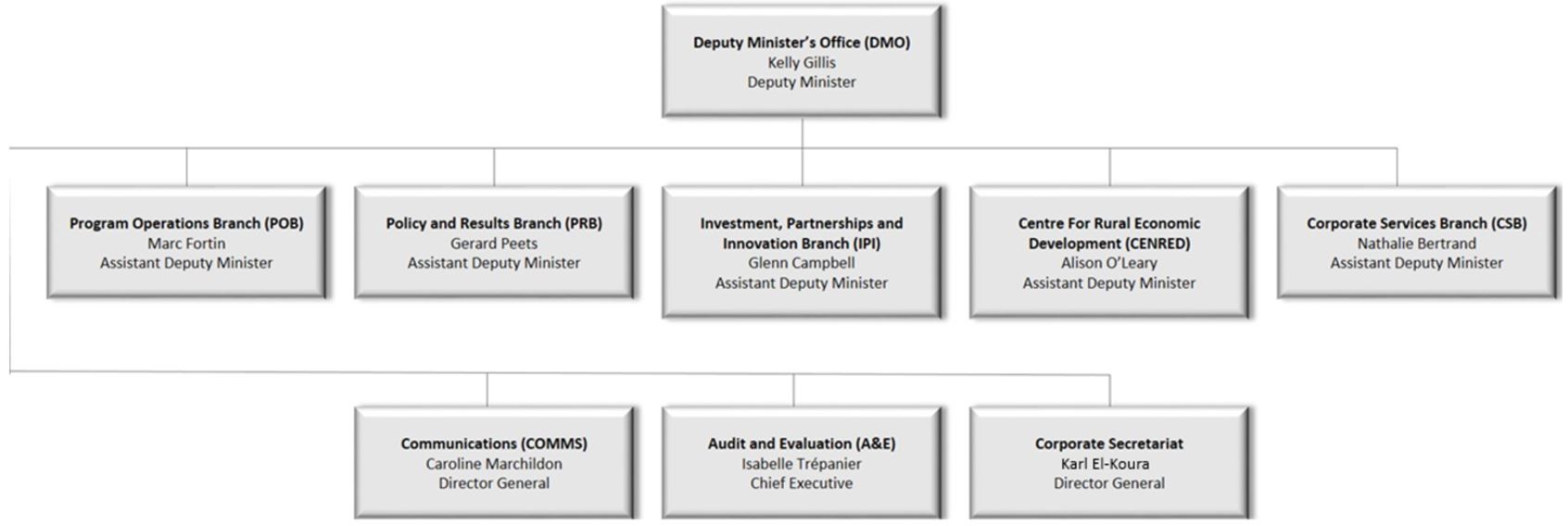Minister of Infrastructure and Communities Transition Book (October 2019)
The Department and Portfolio
- Section 1 - Infrastructure Canada
- Mandate
- INFC Organizational Information
- Deputy Minister's Office (DMO)
- Program Operations Branch (POB)
- Policy and Results Branch (PRB)
- Investment, Partnerships and Innovation Branch (IPI)
- Centre for Rural Economic Development
- Corporate Services Branch (CSB)
- Communications
- Audit and Evaluation
- Corporate Secretariat
- Constituting Legal Authorities and Agreements
- Section 2 - Portfolio Organizations
Section 1 - Infrastructure Canada
Mandate
Public infrastructure projects help address a wide array of challenges for communities across the country—ranging from the rapid growth of our cities, to providing transit options to connect Canadians to employment, services, and recreational opportunities, to providing rural and remote communities with access to broadband, to helping communities cope with climate change and environmental threats to our water and land. Infrastructure Canada provides support to help ensure that Canadians across the country benefit from world-class, modern public infrastructure. To this end, the department makes investments, builds partnerships, develops policies, delivers programs, and fosters knowledge about public infrastructure in Canada.
Infrastructure Canada (INFC) is a key funding partner for provincial, territorial and municipal partners. The department delivers and manages a broad spectrum of programming including the Investing in Canada Infrastructure Program ($33B), the Disaster Mitigation and Adaptation Fund ($2B), the Smart Cities Challenge ($300 million), the Federal Gas Tax Fund ($2B annually indexed at 2 per cent per year, starting in 2014-15, with increases applied in $100-million increments from 2014-15 to 2023-24 plus a one-time $2.2B transfer in 2019-2020) that are open to new project approvals, as well as delivering a dozen other fully allocated programs.
The Infrastructure Canada portfolio includes two of the largest bridge projects in North America; the Samuel De Champlain Bridge Project and the Gordie Howe International Bridge Project. While the Samuel De Champlain Bridge opened to vehicular traffic in early summer 2019, the construction work is continuing on implementation of light rail (REM Project) to finish the remainder of the corridor. The Gordie Howe International Bridge is a new international crossing between Windsor, Ontario and Detroit, Michigan, with an expected completion date of 2024.
The department also houses the Centre for Rural Economic Development. The Centre was established following the appointment of a Minister of Rural Economic Development in January 2019 and the subsequent launch of the Rural Economic Development Strategy. The Centre provides leadership for strong and resilient rural communities as an integral part of the Canadian economy, by providing a focus on rural needs, working across departments and agencies (particularly with the Regional Development Agencies for rural community development, and collaborating with Innovation, Science and Economic Development Canada on rural broadband), with other orders of government, and a range of stakeholders. This has led to increased engagement: for example, the Federation of Canadian Municipalities is calling for the federal government to build a "rural lens" into all policy and programs. During transition, the government may wish to consider the extent to which additional authorities could support these objectives, as well as the relative effectiveness of housing rural economic development functions within Infrastructure Canada, with Innovation, Science and Economic Development/Regional Development Agencies, or elsewhere.
The Infrastructure Canada portfolio includes responsibilities with respect to four organizations:
The Canada Infrastructure Bank (CIB), established to invest, and to seek to attract investment from private sector investors and institutional investors, in infrastructure projects that will generate revenue and that will be in the public interest.
The Windsor-Detroit Bridge Authority (WDBA), responsible for the construction and eventual operation of the Gordie Howe International Bridge between Windsor, Ontario and Detroit, Michigan, which is being delivered through a Public Private Partnership. The project is also overseen by a binational governance entity known as the International Authority, which has equal representation from Canada and Michigan, and monitors compliance with the Crossing Agreement.
The Jacques Cartier and Champlain Bridges Incorporated (JCCBI), responsible for managing, operating and maintaining the Jacques Cartier Bridge, the Champlain Bridge, the Bonaventure Expressway, the federal section of the Honoré Mercier Bridge, the Melocheville Tunnel, and the Champlain Bridge Ice Control Structure. It is also responsible for the deconstruction of the existing Champlain Bridge.
Waterfront Toronto, a tri-government (federal, provincial, municipal) corporation, established under provincial legislation as a not-for-profit entity mandated with leading and implementing the Toronto Waterfront Revitalization Initiative.
Additional information about the portfolio entities can be found in Section 2.
INFC Organization Information
Unlike many federal departments, INFC has no enabling legislation. The work of the department is governed by a number of enabling acts and regulatory mechanisms, and its operating budget is time limited.
Infrastructure Canada's budget in 2019-20 is $11B, and is comprised of four main elements; namely $83.1M to support the department's operating functions and the salary of its 472 full-time equivalents (FTEs); $1.3B allocated to Major Bridges, which is tied specifically to the Samuel De Champlain Bridge Corridor Project and the Gordie Howe International Bridge; $5.2B in Grants and Contributions funding, which is used to reimburse claims submitted by recipients; and $4.4B in statutory funding for the Gas Tax Fund, the Employee Benefit Plan and Ministerial salary and car allowance.
The department principally operates from the National Capital Region, with the exception of the Samuel De Champlain Bridge Corridor Project team, which operates from Ottawa and Montreal.
Led by the Deputy Minister of Infrastructure and Communities, the department is served by five Assistant Deputy Ministers, working in 8 functional areas, as outlined below:
Deputy Minister's Office (DMO)
DEPUTY MINISTER: Kelly Gillis
The Deputy Minister's Office (DMO) serves as a single point of contact for Ministers and their offices to ensure horizontal linkages and integration of issues across the department. The Deputy Minister and her advisors provide Ministers and their staff with advice on all business lines of the department.
Deputy Minister's Office – Key Contacts
- Jennifer Eyre – Chief of Staff
- Jeanna Chan – Infrastructure and Communities Departmental Liaison
- Line Geerts – Executive Assistant to the Deputy Minister
Program Operations Branch (POB)
BRANCH HEAD: Marc Fortin, Assistant Deputy Minister
The Program Operations Branch manages the operations of all INFC programs, including implementing the Investing in Canada Infrastructure Program (ICIP), the Disaster Mitigation and Adaptation Fund (DMAF), Gas Tax Fund (GTF) as well as Legacy Programs.
POB negotiates and manages infrastructure funding agreements. The Branch also provides program-related advice; risk management and analysis; environmental assessments; Indigenous consultation determinations; and program reporting.
POB – Directorates
- Nathalie Lechasseur – Director General, Program Integration
- Jean-François La Rue – Director General, North / Atlantic / Ontario, Disaster Mitigation and Adaptation Fund
- Michèle Ouellette – Director General, Quebec / West
Policy and Results Branch (PRB)
BRANCH HEAD: Gerard Peets, Assistant Deputy Minister
The Policy and Results Branch identifies and assesses broad infrastructure issues, priorities, needs for potential federal action and also contributes to federal policy development. PRB reviews and assesses strategic infrastructure investments and provides advice on policy and cabinet issues. The Branch is responsible for reporting on results, as well as focusing on data and research to strengthen evidence-based decision-making for all orders of government. PRB is responsible for delivering the Smart Cities Challenge.
PRB – Directorates
- Robert Judge – Acting Director General, Strategic and Sectoral Policy
- Sean Keenan – Director General, Economic Analysis and Results
- Jenny Tremblay – Director General, Smart Cities Challenge
Investment, Partnerships and Innovation Branch (IPI)
BRANCH HEAD: Glenn Campbell, Assistant Deputy Minister
The Investment, Partnerships and Innovation Branch is a centre of expertise on innovative approaches to infrastructure delivery, including alternative approaches to funding, financing and procurement, as well as opportunities for partnerships with the private sector to deliver public infrastructure.
IPI is responsible for program delivery through the P3 Canada Fund, intergovernmental partnerships through Waterfront Toronto Revitalization, oversight and support for the Canada Infrastructure Bank, as well as the Gordie Howe International Bridge project in Windsor-Detroit and the Samuel de Champlain Bridge project in Montréal.
The Branch also supports horizontal policy development and monitors developments in the infrastructure finance sector, domestically and globally.
IPI – Directorates
- Lisa Mitchell – Senior Director, Policy
- Marie-Josée Lambert – Senior Director, Operations
- Chantale Côté – Acting Director General, Major Bridge Projects
Centre for Rural Economic Development
BRANCH HEAD: Alison O'Leary, Assistant Deputy Minister
The Centre for Rural Economic Development works via a whole-of-government approach to coordinate research, analyze data, and provide advice regarding rural economic development issues.
The Centre advances strong and resilient rural communities as an integral part of the Canadian economy by working across departments and agencies, with other orders of government, and a range of stakeholders. The Centre encourages a focus on rural needs in federal policies and programs.
Corporate Services Branch (CSB)
BRANCH HEAD: Nathalie Bertrand, Assistant Deputy Minister
The Corporate Services Branch provides advice, support and services relating to INFC corporate functions, including procurement, human resources, finance, security, planning and administration, accommodations, information management, and information technology.
CSB – Directorates
- Greg Hall – Director General, Finance and Administration
- Véronique Gauthier – Director General, Human Resources
- Joann Shields – Chief Information Officer and Director General, Information Management and Information Technology
Communications
BRANCH HEAD: Caroline Marchildon, Director General
The Communications Branch provides advice, planning, and delivery of communications activities and products that support the department's mandate and that inform Canadians on progress and results of federal investments in infrastructure.
Audit and Evaluation
BRANCH HEAD: Isabelle Trépanier, Chief Executive Audit and Evaluation
The Audit and Evaluation Branch conducts independent audits to provide assurance on the governance, risk management and control processes of the department. The Branch also carries out evaluation projects to assess the relevance, value, and impact of programs and initiatives.
Corporate Secretariat
BRANCH HEAD: Karl El-Koura, Director General, Corporate Secretariat
The Corporate Secretariat supports the department by providing advice and services in the areas of parliamentary affairs, access to information and privacy, ministerial coordination and trips, executive correspondence; portfolio coordination, and internal governance.
The Corporate Secretariat manages the MINO Admin mailbox that can be used by ministerial staff to submit questions related to human resources, IT and IM, accommodations, security, and other administrative matters.
Constituting Legal Authorities and Agreements
- Canada Strategic Infrastructure Fund Act (2002, c. 9, s. 47) (CSIF)
- P.C. Order in Council 2004-0325; (provides authority for the appropriate Minister for the Office of Infrastructure of Canada to enter into transfer payment agreements related to infrastructure initiatives in Canada) Note: Infrastructure Canada does not have an enabling statute.
- The following pieces of legislation pertaining to the Gas Tax Fund:
- Keeping Canada's Economy and Jobs Growing Act, S.C. 2011, c. 24; and
- Economic Action Plan 2013 Act, No. 1, S.C. 2013, c. 33, section 233.
- The following Order in Council pertaining to the assignment of the Minister for Rural Economic Development:
- P.C. Order in Council 2019-0004
- The following legislation, Orders in Council and Canada-Michigan Crossing Agreement pertaining to the Gordie Howe International Bridge Project:
- Crossing Agreement between Her Majesty the Queen in Right of Canada and the State of Michigan and the Crossing Authority;
- International Bridges and Tunnels Act, S.C. 2007, c.1;
- Bridge to Strengthen Trade Act, S.C. 2012, c. 31, s. 179;
- P.C. Order in Council 2012-1350 (issuance of the letters patent for the WDBA);
- P.C. Order in Council 2015-1236 (transfers from the Minister of Transport to the Minister of Infrastructure, Communities and Intergovernmental Affairs the powers, duties and functions under the Letters Patent of incorporation for the establishment of the WDBA);
- P.C. Order in Council 2015-1237 (designates the Minister of Infrastructure, Communities and Intergovernmental Affairs as the appropriate Minister for the WDBA);
- P.C. Order in Council 2015-1238 (transfers from the Minister of Transport to the Minister of Infrastructure, Communities and Intergovernmental Affairs the powers, duties and functions under the Bridge to Strengthen Trade Act); and
- P.C. Order in Council 2017-1053 (issuance of the supplementary letters patent amending the letters patent for the WDBA)
- The following legislation and Order in Council pertaining to the New Bridge for the St. Lawrence Corridor Project (commonly known as the Samuel De Champlain Bridge Corridor Project):
- New Bridge for the St. Lawrence Act, S.C. 2014, c. 20, s. 375; and
- P.C. Order in Council 2014-0144 (transfers from the Department of Transport to the Office of Infrastructure of Canada the control and supervision of that portion of the federal public administration in the Department of Transport known as the Unit Responsible for Federal Bridges in the Region of Montreal).
- The following legislation and Order in Council pertaining to the Canada Infrastructure Bank:
- Canada Infrastructure Bank Act, S.C. 2017, c. 20, s. 403; and
- P.C. Order in Council 2017-1007 (designates the Minister of Infrastructure, Communities and Intergovernmental Affairs to be the Minister for the purposes of the Canada Infrastructure Bank Act).
- The following Orders in Council pertaining to Waterfront Toronto:
- P.C. Order in Council 2015-1239 (designates the Minister of Infrastructure, Communities and Intergovernmental Affairs as the Minister responsible for matters relating to the activities of the federal government with respect to Waterfront Toronto); and
- P.C. Order in Council 2015-1240 (designates the Minister of Infrastructure, Communities and Intergovernmental Affairs to represent Her Majesty in right of Canada for the purposes of the Toronto Waterfront Revitalization Corporation Act).
Section 2 - Portfolio Organizations
As previously outlined, the Minister of Infrastructure and Communities has responsibilities over four arm's length organizations:
- The Canada Infrastructure Bank (CIB)
- The Windsor-Detroit Bridge Authority (WDBA)
- The Jacques Cartier and Champlain Bridges Incorporated (JCCBI)
- Waterfront Toronto
Each organization has a unique mandate and organizational structure. In accordance with the enabling legislation, the Minister of Infrastructure and Communities exercises varying degrees of responsibility for the organizations within the portfolio.
See below for more detailed information on each portfolio organization.
Canada Infrastructure Bank
LEADERSHIP
Janice Fukakusa, Chair of the Board of Directors
[redacted image]
Pierre Lavallée, President and Chief Executive Officer
CORPORATE INFORMATION
Organization Type: Crown Corporation (FAA, Sched. III, Part I)
Incorporation: Canada Infrastructure Bank Act
Year Incorporated: 2017
Head Office: Toronto, ON
Website: www.cib-bic.ca
MISSION, MANDATE AND DESCRIPTION
- The Canada Infrastructure Bank (CIB) is a Crown corporation that reports to Parliament through the Minister of Infrastructure and Communities.
- It is mandated to invest $35 billion of federal funding in revenue-generating infrastructure projects that are in the public interest and that attract private capital.
- The CIB acts as a centre of expertise by structuring proposals, negotiating infrastructure investments, and attracting private capital, advising governments on infrastructure projects, and collecting and disseminating data on the state of infrastructure in Canada to better inform in frastrcuture investment decisions.
- Working with provincial, territorial, municipal, federal, Indigenous and private sector investor partners, the Bank aims to transform the way infrastructure is planned, funded and delivered in Canada by:
- engaging private sector partners early in the planning and design process;
- advancing revenue-based business models, where appropriate; and exploring new and innovative approaches to project finance and delivery.
GOVERNANCE
The CIB is led by a Chief Executive Officer, who reports to the Board of Directors.
The CIB's Board is composed of the Chairperson and 8 to 11 other directors, appointed by the Governor in Council.
Windsor-Detroit Bridge Authority
LEADERSHIP
[redacted image]
Dwight Duncan, Chair of the Board of Directors
Bryce Phillips, Chief Executive Officer
CORPORATE INFORMATION
Organization Type: Crown Corporation (FAA, Sched. III, Part I)
Incorporation: Established by Letters Patent pursuant to subsection 29(1) of International Bridges and Tunnels Act; P.C. Order-in-Council 2012-1350
Year Incorporated: 2012
Head Office: Windsor, ON
Website: www.gordiehoweinternationalbridge.com
MANDATE, MISSION AND DESCRIPTION
- Windsor-Detroit Bridge Authority (WDBA) is a Crown corporation that reports to Parliament through the Minister of Infrastructure and Communities.
- WDBA is responsible for the delivery of the Gordie Howe International Bridge between Windsor, Ontario and Detroit, Michigan, through a public-private partnership (P3). It is also responsible for project oversight of the construction and the operation of the new crossing. As the operator of the new bridge, WDBA will set and collect all tolls.
- The project is a vital investment to the Canadian economy, and will facilitate increased trade capacity between Canada and the United States by providing redundancy and highway-to-highway connectivity at Windsor-Detroit – the business commercial land border crossing between Canada and the United States.
GOVERNANCE
WDBA is led by a President and Chief Executive Officer (CEO) and governed by a Board of Directors. The Board is composed of up to nine members, including the Chairperson and the CEO, who are appointed by the Governor in Council. Directors are appointed by the Minister with the approval of the Governor in Council.
In addition, the International Authority is a joint Canada-Michigan governance entity responsible for monitoring compliance of WDBA with the Crossing Agreement signed by Canada and Michigan. The International Authority consists of six members with equal representation from Canada and Michigan. Two members are appointed by Canada, one appointed by WDBA and three appointed by Michigan.
Jacques Cartier and Champlain Bridges Incorporated
LEADERSHIP
Paul T. Kefalas, Chair of the Board of Directors
[redacted image]
Sandra Martel, Chief Executive Officer
CORPORATE INFORMATION
Organization Type: Crown Corporation (FAA, Sched. III, Part I)
Incorporation: Canada Business Corporations Act
Year Incorporated: JCCBI was established on November 3, 1978, and was a wholly owned subsidiary of the St. Lawrence Seaway Authority until 1998 when it became a wholly owned subsidiary of the Federal Bridge Corporation Limited. In 2014, JCCBI became a parent Crown corporation reporting to the Minister of Infrastructure and Communities.
Head Office: Longueuil, QC
Website: www.jacquescartierchamplain.ca
MISSION, MANDATE AND DESCRIPTION
- The Jacques Cartier and Champlain Bridges Incorporated (JCCBI) is a Crown corporation that reports to Parliament through the Minsiter of Infrastructure and Communities.
- It oversees the management, maintenance and rehabilitation of three bridges and their approaches, namely the Jacques Cartier Bridge, the Samuel De Champlain Bridge and the federal portion of the Honoré Mercier Bridge. It is also responsible for three related infrastructures, namely the federal section of the Bonaventure Expressway, the Champlain Bridge Ice Control Structure and the Melocheville Tunnel. These structures play a vital role in the regional transportation system and economy.
- The JCCBI's mission is to ensure the mobility of users, the safety and the longevity of infrastructure using a systematic approach based on sustainable development.
- The Corporation plays a vital rolel in the daily life of thousands of users whose modes of transportation are constantly evolving. As an island city, Montreal depends on bridges to ensure the passage and mobility of goods and people.
GOVERNANCE
The JCCBI is governed by a Board of Directors, which is composed of 7 members, including the Chairperson and CEO. The Board members are appointed by the Minister upon approval of the Governor in Council. The Chair of the Board of Directors and the Chief Executive Officer are appointed by the Governor in Council upon recommendation from the Minister.
Waterfront Toronto
LEADERSHIP
Stephen Diamond, Chair of the Board of Directors
George Zegarac, Chief Executive Officer
CORPORATE INFORMATION
Organization Type: Tri-Government Organization
Incorporation: Toronto Waterfront Revitalization Corporate Act
Year Incorporated: 2001
Head Office: Toronto, ON
Website: www.waterfronttoronto.ca
MISSION, MANDATE AND DESCRIPTION
- Waterfront Toronto (formerly Toronto Waterfront Revitalization Corporation) is a tri-government organization. It was established following the commitment of $500 million each by the Governments of Canada, Ontario, and Toronto. All three levels of government are represented on its board of Directors and the Minister of Infrastructure and Communities is responsible for appointing federal members.
- Waterfront Toronto has a 25-year mandate and $30-billion long-term plan to transform 800 hectares of brownfield lands on Toronto's waterfront. This is one of the largest infrastructure projects in North America.
GOVERNANCE
Waterfront Toronto's oversight is provided through three venues: a Board of Directors, an Intergovernmental Steering Committee, and an Executive Steering Committee.
Waterfront Toronto's Board of Directors is composed of 12 members (four each appointed by the Government of Canada, the Province of Ontario, and the City of Toronto). A Chair may be jointly appointed by the three orders of government.
- Date modified:














